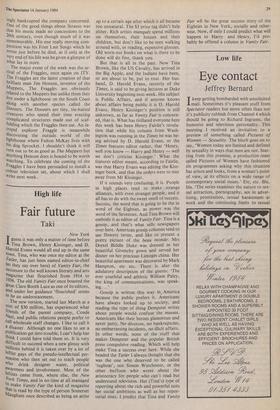High life
Fair future
Taki
Iguess it was only a matter of time before Tina Brown, Henry Kissinger, and D. Harold Evans would all end up in the same tftn. Tina, who was once my editor at the Taller, has just been named editor-in-chief (as they say over here) of Vanity Fair, the successor to the well known literary and arts magazine that flourished from 1914 to 1936. The old Vanity Fair once boasted the great Clare Booth Luce as one of its editors, and under her guidance 'flourished' seems to be an understatement.
The new version, started last March at a Cost of $30 million, has experienced what friends of the parent company, Conde Nast, and public relations people prefer to call wholesale staff changes. I like to call it a disaster. Although no one likes to see a Publication get into trouble, I can't help but think I could have told them so. It is very difficult to succeed when a new glossy with Millions behind it is taken over by a lot of leftist gays of the pseudo-intellectual per- suasion who then set out to teach people who drink designer water, political awareness and involvement. Most of the leftists came from, where else, the New York Times, and in no time at all managed to make Vanity Fair the kind of magazine that is read by the type of person Somerset lvlaugham once described as being an artist up to a certain age after which it all became too unnatural. The $3 price tag didn't help either. Rich artists mangues spend millions on themselves, their houses and their children, but don't like to be seen walking around with, or reading, expensive glossies. Old worn-out books on what is there to be done will do fine, thank you.
But that is all in the past. Now Tina Brown, like the US Cavalry, has arrived in the Big Apple, and the Indians have been, or are about to be, put to rout. Her hus- band, D. Harold Evans, recently of the Times, is said to be giving lectures at Duke University beginning next week. His subject is Public Affairs, and if anyone knows about affairs being public it is D. Harold Evans. Henry Kissinger's position is still unknown, as far as Vanity Fair is concern- ed, that is. What has titillated everyone here this week has been Henry Fairlie's revela- tion that while his column from Wash- ington was running in the Times he was be- ing advised by D. Harold Evans, or the lJmes features editor rather, that 'Henry, well you know — Harry and Henry — well we don't criticise Kissinger.' What the features editor meant, according to Fairlie, was that Harry Evans was editing the Kiss- inger book, and that the orders were to stay away from Mr Kissinger.
If it sounds very confusing, it is. People in high places tend to make strange alliances, with even stranger people, and it all has to do with the sweet smell of success. Success, the word that is going to be the in word of the Eighties, as power was the word of the Seventies. And Tina Brown will embody it as editor of Vanity Fair. Tina is a gossip, and that's what sells newspapers over here. American gossip columns tend to use flowery terms, and like to present a pretty picture of the beau monde: Mrs Drexel Biddle Duke was dressed in her beautiful Givenchy gown and served her dinner on her precious Limoges china. Her beautiful apartment was decorated by Mark Hampton, etc etc. There is also the adulatory description of the guests: 'The ever youthful and athletic William Paley, the king of communications, was speak- ing...'
Gossip is written this way in America because the public prefers it. Americans have always looked up to society, and reading the type of thing Dempster writes about people would confuse the masses. Americans like their heroes glamorous and never petty, No divorces, no bankruptcies, no embarrassing incidents, no illicit affairs. In other words, none of the stuff that makes Dempster and the popular British press compulsive reading. Which will help make Tina a success over here. While she headed the Taller I always thought that she was the one who deserved to be called 'tugboat', not Simon Winchester, or the other buffoon who wrote about the aristocracy for people who can't read but understand television. Her (Tina's) type of reporting about the rich and powerful suits her social ambitions as well as her repor- torial ones. I predict that Tina and Vanity Fair wit be the great success story of the Eighties in New York, socially and other- wise. Now, if only I could predict what will happen to Harry and Henry, I'd pro- bably be offered a column in Vanity Fair.






































 Previous page
Previous page